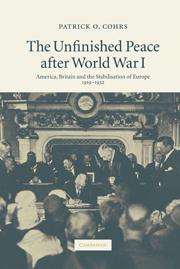Book contents
- Frontmatter
- Contents
- Acknowledgements
- List of abbreviations
- A note on the footnotes and bibliography
- Introduction
- Prologue
- 1 The wider challenges
- 2 Wilson, Lloyd George and the quest for a ‘peace to end all wars’
- 3 The ill-founded peace of 1919
- 4 The escalation of Europe's post-Versailles crisis, 1920–1923
- Part I The Anglo-American stabilisation of Europe, 1923–1924
- Part II Europe's nascent Pax Anglo-Americana, 1924–1925
- Part III The unfinished transatlantic peace order: the system of London and Locarno, 1926–1929
- Epilogue
- Conclusion
- Map: Post-World War I Europe after the peace settlement of Versailles
- Bibliography
- Index
Introduction
Published online by Cambridge University Press: 21 July 2009
- Frontmatter
- Contents
- Acknowledgements
- List of abbreviations
- A note on the footnotes and bibliography
- Introduction
- Prologue
- 1 The wider challenges
- 2 Wilson, Lloyd George and the quest for a ‘peace to end all wars’
- 3 The ill-founded peace of 1919
- 4 The escalation of Europe's post-Versailles crisis, 1920–1923
- Part I The Anglo-American stabilisation of Europe, 1923–1924
- Part II Europe's nascent Pax Anglo-Americana, 1924–1925
- Part III The unfinished transatlantic peace order: the system of London and Locarno, 1926–1929
- Epilogue
- Conclusion
- Map: Post-World War I Europe after the peace settlement of Versailles
- Bibliography
- Index
Summary
What will now happen – once the phase of exhaustion has passed – is that peace, not war, will have been discredited …
Politics means slow, strong drilling through hard boards, with a combination of passion and a sense of judgement … It is of course entirely correct, and a fact confirmed by all historical experience, that what is possible would never have been achieved if, in this world, people had not repeatedly reached for the impossible. But the person who can do this must be a leader; not only that, he must, in a very simple sense of the word, be a hero.
(Max Weber, ‘The Profession and Vocation of Politics’, January 1919)This study is based on a simple premise: what needs to be re-appraised when examining the history of international politics in the aftermath of World War I, the twentieth century's original cataclysm, is not crisis or the demise of international order. It is, rather, the contrary: the achievement of any international stabilisation in Europe – even if it was to prove relative and ultimately unsustainable. Grave crises can engender a fundamental transformation of the mentality and practices of international politics. This in turn can alter, and improve, the very foundations of international stability. As has been shown, such a transformation gave rise to the durable Vienna system of 1814/15, forged after decades of revolutionary, then Napoleonic, wars.
- Type
- Chapter
- Information
- The Unfinished Peace after World War IAmerica, Britain and the Stabilisation of Europe, 1919–1932, pp. 1 - 19Publisher: Cambridge University PressPrint publication year: 2006



